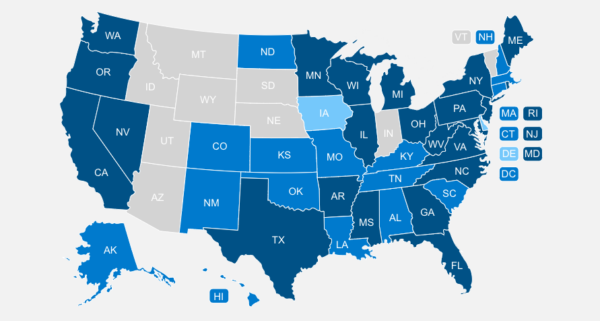
How to Start a Nonprofit in Arizona: A Step-by-Step Guide for First-Time Founders
August 26, 2025
How to Start a Nonprofit in California: A Step-by-Step Guide That Actually Works
August 26, 2025How to Start a Nonprofit in Arkansas: A Step-by-Step Legal Guide

Whether you’re passionate about education, healthcare, or community development, starting a nonprofit in Arkansas could be your path to making a lasting impact.
However, transforming your vision into a registered 501(c)(3) organization requires careful planning and precise legal steps. Many aspiring founders feel overwhelmed by the complex requirements and paperwork involved in starting a nonprofit.
The good news? You don’t have to navigate this journey alone. At Labyrinth, Inc., we understand every nuance of the formation process, and we can help you move forward with confidence. This comprehensive guide breaks down every step of establishing your Arkansas nonprofit—from defining your mission to securing your tax-exempt status. Ready to turn your charitable vision into reality? Let’s walk through the process together!
Planning Your Arkansas Nonprofit
You’ve outlined community needs and drafted a mission statement. Now what? Let’s tackle the state filings that move you forward. Before diving into the legal paperwork, taking time to plan your Arkansas nonprofit thoroughly will set a strong foundation for success.
Identifying Your Mission and Purpose
Your mission statement serves as the cornerstone of your nonprofit, guiding every decision and action. A powerful mission statement should be concise, memorable, and clearly communicate why your organization exists. Rather than including specific programs, focus on describing the expected outcomes and impact of your work.
To craft an effective mission statement:
- Define the fundamental problem your organization aims to solve
- Identify who you serve and how you serve them
- Keep it under 20 words while remaining specific and operational
- Use action-oriented language that inspires supporters
Your mission statement will appear on all electronic and printed communications, additionally forming a crucial part of your Articles of Incorporation and bylaws. When we work with you on formation, we’ll ensure your mission statement aligns with IRS requirements for tax-exempt status while maintaining your unique vision.
Researching Local Community Needs
Understanding local needs helps prevent duplicating existing services while ensuring your programs truly benefit Arkansas residents. The Arkansas Department of Health conducts comprehensive needs assessments every five years, providing valuable insights into statewide challenges, as detailed in their Maternal and Child Health Needs Assessment.
Start by examining your target community:
- Study demographics and existing resources
- Gather feedback through surveys and public forums
- Review published data from local government agencies
- Connect with potential beneficiaries to understand their challenges
Furthermore, consider partnering with existing organizations rather than starting from scratch if similar services already exist in your area. This approach often leads to more efficient use of resources and greater community impact.
Creating a Startup Budget
A detailed budget serves as your financial roadmap and demonstrates fiscal responsibility to potential donors. Your initial budget should project both expenses and revenue for at least three years, as required for the IRS Form 1023 application.
Here are the key formation costs to consider:
- Arkansas Articles of Incorporation filing fee: $45 (online) or $50 (mail)
- IRS Form 1023 filing fee: $600 (or $275 for Form 1023-EZ if eligible)
- Processing time: Arkansas typically processes within 5-10 business days; IRS review can take 3-12 months
- Your time investment: Approximately 10-15 hours for document preparation and filing
The Better Business Bureau recommends spending at least 65% of your funding on programs and no more than 35% on overhead expenses. Working with Labyrinth can help ensure your budget aligns with industry standards while meeting regulatory requirements. With our guidance, you’ll develop realistic projections that satisfy IRS scrutiny during the 501(c)(3) application process.
Remember to document all assumptions and calculations behind your budget figures. Additionally, create separate budgets for capital needs and special projects to maintain a clear picture of operational costs. Through careful planning and realistic financial projections, you’ll build a strong foundation for your nonprofit’s long-term sustainability.
Forming Your Leadership Team
Building a strong leadership team marks a crucial milestone in establishing your Arkansas nonprofit. The right board members and clear responsibilities create the foundation for your organization’s success.
Selecting Initial Board Members
Arkansas law requires a minimum of three unrelated board members to establish a nonprofit organization. While Arkansas technically allows fewer directors, we recommend using three to align with IRS standards for 501(c)(3) organizations. When recruiting your initial board, focus on individuals who bring diverse skills and experiences to support your mission.
Consider these essential qualities when selecting board members:
- Professional expertise in finance, law, or your nonprofit’s focus area
- Strong community connections
- Commitment to attend meetings and participate actively
- No conflicts of interest with your organization
Subsequently, establish a board recruitment committee of two to three members to oversee future selections. This committee should assess skills gaps, conduct interviews, and ensure potential candidates understand their responsibilities. At Labyrinth, we can guide you through this critical selection process, helping you identify the right mix of skills and ensuring your board structure meets both state and federal requirements for tax-exempt organizations.
Defining Board Responsibilities
Board members serve as fiduciaries who guide your organization toward sustainable growth through sound governance. Under Arkansas law, board members have three fundamental legal duties:
Duty of Care
- Participate actively in decision-making
- Review financial statements, audits, and organizational documents
- Maintain reasonable oversight of operations
- Attend meetings consistently
Duty of Loyalty
- Act in the organization’s best interests
- Disclose potential conflicts of interest
- Complete annual conflict-of-interest statements
- Recuse from discussions where conflicts exist
Duty of Obedience
- Ensure compliance with state and federal laws
- Follow organizational bylaws
- Adhere to the stated mission
Beyond these legal obligations, board members must also:
- Participate in strategic planning
- Monitor program effectiveness
- Secure adequate financial resources
- Protect organizational assets
- Enhance public standing
- Select and evaluate the executive director
The initial organizational meeting serves as a pivotal moment where board members officially begin their duties. During this meeting, they will:
- Approve organizational bylaws
- Adopt conflict-of-interest policies
- Elect officers
- Approve essential resolutions
- Document all decisions in meeting minutes
Arkansas allows reasonable compensation for board members based on services rendered. Nevertheless, most board members serve as volunteers without compensation to maintain the organization’s charitable focus.
Through proper selection and clear definition of responsibilities, your leadership team can effectively guide your nonprofit toward achieving its mission. Remember to document all board-related policies and procedures thoroughly, as these will be required for your IRS Form 1023 application. We ensure these critical governance documents meet all regulatory standards from the start.
Legal Formation Steps
Establishing your nonprofit’s legal foundation requires careful attention to detail and precise documentation. Following Arkansas state requirements ensures your organization starts on solid legal ground. With our end-to-end formation support, you can navigate these complex steps with confidence.
Choosing Your Nonprofit Name
Selecting a distinctive name marks the first step toward legal recognition. The Arkansas Secretary of State (501-682-3409, sos.arkansas.gov) maintains strict guidelines for nonprofit names, as outlined in their Name Availability Guidelines:
- Search availability through the Secretary of State’s database
- Avoid names similar to existing organizations
- Consider geographic locations and service distinctions
- Ensure compliance with trademark regulations
Key Naming Considerations:
- Corporate endings like ‘Corp.’ or ‘Inc.’ are optional in Arkansas
- Terms like ‘bank,’ ‘trust,’ or ‘engineering’ require additional approval
- Use of ‘Razorback(s)’ needs University of Arkansas approval
- Web address prefixes or suffixes do not distinguish names
We conduct comprehensive name searches across state and federal databases, ensuring your chosen name is available and compliant with all regulations before you invest in branding materials.
Filing Articles of Incorporation
The Articles of Incorporation officially establish your nonprofit’s existence in Arkansas. Remember, filing Articles of Incorporation creates your nonprofit corporation, but this alone does not make your organization tax-exempt or allow donors to claim tax deductions. The state offers two filing options:
Online Filing:
- Cost: $45.00
- Faster processing time
- Available through Arkansas Secretary of State website
Mail Filing:
- Cost: $50.00
- Send to Arkansas Secretary of State office
- Include required documentation
Essential components of your Articles include:
- Organization name and purpose
- Registered agent information
- Initial board member details
- Property distribution provisions upon dissolution
- IRS-compliant language for 501(c)(3) status
Your Articles must include specific IRS-approved purpose and dissolution clauses to qualify for 501(c)(3) status later. Arkansas provides sample language for 501(c)(3) eligibility, which should be included in your Articles of Incorporation. When we work with you on formation, we draft these documents with precise language that satisfies both state incorporation requirements and federal tax-exemption standards. For the fastest processing, we offer state-specific drop-off service where permitted, expediting your approval timeline.
Getting an EIN Number
After your Articles of Incorporation are filed and approved, you’ll need an Employer Identification Number (EIN). This nine-digit identifier serves as your nonprofit’s federal tax ID and proves essential for:
- Opening bank accounts
- Filing tax returns
- Applying for 501(c)(3) status
- Managing payroll
- Establishing vendor relationships
The Internal Revenue Service issues EINs through multiple channels:
- Online application (preferred method)
- Fax submission
- Mail application
- Phone application (international applicants only)
Important Considerations:
- Apply only after legal formation is complete
- No cost for EIN application
- Immediate processing for online applications
- Third parties can obtain EINs with proper authorization
As part of our comprehensive formation services, we handle your EIN acquisition immediately after your Articles of Incorporation are filed. This ensures you have all necessary identifiers in place before moving forward with bank accounts and tax-exemption applications. Proper documentation throughout this process supports future tax-exempt status applications and operational compliance.
Applying for Tax Exemption
Securing tax-exempt status represents a critical phase in your nonprofit journey. Remember that forming a nonprofit corporation doesn’t automatically grant tax exemption—you must apply separately to the IRS. Understanding both federal and state requirements ensures your organization maximizes its financial resources through available tax benefits. With our 15+ years of experience, this complex process becomes manageable and straightforward.
Federal 501(c)(3) Application Process
The Internal Revenue Service offers two pathways for obtaining federal tax-exempt status. Form 1023 serves as the standard application, although smaller organizations might qualify for the streamlined Form 1023-EZ. We provide support for both 1023 and 1023-EZ filings, ensuring you choose the right path for your organization.
Standard Form 1023:
- Filing fee: $600
- Comprehensive documentation required
- Detailed examination of organizational structure
- Processing time: Typically 3-12 months
Form 1023-EZ Option:
- Reduced filing fee: $275
- Simplified application process
- Available exclusively for qualified small organizations
- Must complete eligibility worksheet
- Processing time: Often 2-4 weeks
Both applications require thorough preparation and attention to detail. When we work with you on formation, we handle the entire IRS application process, including drafting all required narratives, preparing financial projections, and responding to any IRS correspondence. This comprehensive support comes with a 100% IRS tax exemption approval guarantee, giving you confidence throughout the process.
Arkansas State Tax Exemption Requirements
After receiving your federal tax-exempt determination letter, your nonprofit must separately apply for Arkansas state tax exemptions. Many states require this separate application once you have the IRS determination letter. We manage these state-specific requirements as part of our end-to-end formation support.
State Income Tax Exemption:
- Submit Form AR1023CT to the Department of Finance and Administration (501-682-2242, dfa.arkansas.gov)
- No filing fee required
- Include copy of:
- IRS determination letter
- First two pages of Form 1023
- Statement declaring exemption under state code
If your organization is awaiting federal approval, provide:
- Completed Form AR1023CT
- Articles of Incorporation
- Organizational bylaws
Processing typically takes up to three months; plan your timeline accordingly. Through our secure, SOC 2 Type II nonprofit client portal, you can track every step of both federal and state applications in real-time.
Additional State Requirements:
For sales tax exemption, file Form STAX-200N with the Arkansas Department of Finance and Administration.
Annual Compliance:
Maintaining tax-exempt status requires ongoing compliance:
- File annual reports by August 1st with the Arkansas Secretary of State
- Submit online through Secretary of State portal
- There is no state fee to file the nonprofit annual report in Arkansas
- File Form 990 annually with the IRS
- Keep accurate financial records
Remember, nonprofit corporation status alone does not guarantee tax exemption. Each benefit requires separate application and ongoing compliance with state and federal regulations. For organizations that have lost their tax-exempt status, we provide reinstatement support using the same IRS forms (1023/1024), guiding you through the reinstatement process.
Setting Up Operations
Proper operational setup ensures your Arkansas nonprofit runs smoothly from day one. Through systematic organization of financial accounts, policies, and record-keeping systems, your organization builds a foundation for sustainable growth. We include first-year charitable solicitation registration as part of bundled services, streamlining your path to operational readiness.
Opening a Bank Account
To open your account, prepare these essential documents:
- EIN letter
- Articles of Incorporation
- Initial board meeting minutes
- Formation documents
Some institutions may require a minimum deposit to activate the account. With all formation documents properly prepared through our services, opening your nonprofit bank account becomes a straightforward process.
Creating Essential Policies
Effective policies safeguard your organization’s assets and ensure operational consistency. A flexible bylaws template works well for startups and can be revised as your organization grows. Start by establishing these fundamental guidelines:
Document Retention Policy
A comprehensive document retention policy outlines:
- Storage requirements for different document types
- Retention schedules
- Destruction procedures
- Digital storage protocols
Your policy should address both physical and digital records, ensuring compliance with state and federal regulations. Additionally, implement backup systems for cloud-stored documents to protect critical information. Through your secure nonprofit portal, you can store and access all essential documents while maintaining proper retention protocols.
Financial Management Policies
Develop clear guidelines for:
- Internal controls
- Procurement procedures
- Investment strategies
- Cost allocation methods
Developing Record-Keeping Systems
Accurate record-keeping proves essential for maintaining tax-exempt status and donor trust.
Financial Records
Maintain detailed documentation of:
- Monthly transaction reports
- Financial position statements
- Revenue and expenditure records
- Bank statement reconciliations
Donation Records
Track essential donor information:
- Contribution amounts
- Dates of gifts
- Donor contact details
- Gift restrictions or designations
Program Documentation
Record key program metrics:
- Number of people served
- Program costs
- Fundraising event details
- Activity outcomes
Corporate Records
Preserve critical organizational documents:
- Board meeting minutes
- Corporate annual reports
- Bylaw amendments
- IRS correspondence
Consider implementing specialized nonprofit accounting software to streamline operations. Your secure client portal provides a centralized location for maintaining these records while ensuring compliance with document retention requirements.
Remember, Arkansas law requires nonprofits to file annual reports by August 1st. We provide annual report filing services to ensure you stay compliant. Establishing organized record-keeping systems initially saves considerable time and resources throughout your organization’s lifecycle. With transparent pricing and no hidden fees, we help you budget accurately for both initial setup and ongoing compliance needs.
Conclusion
Starting a nonprofit in Arkansas requires careful attention to detail and systematic execution across multiple areas. Each step, from initial planning through operational setup, builds upon the previous one to create a strong foundation for your organization.
Above all, success depends on thorough preparation—crafting a clear mission, building a qualified board, and establishing proper legal structures. A well-planned approach helps avoid common pitfalls while ensuring compliance with state and federal requirements.
At Labyrinth, we can significantly streamline this complex process. With 1-on-1 guidance from our specialists who bring 15+ years of nonprofit leadership experience, you benefit from expertise that proves especially valuable when navigating tax exemption applications and creating essential operational policies. From charitable solicitation to corporate filings, having comprehensive compliance support means you won’t need to manage multiple vendors—we can handle it all while you focus on your mission.
Remember that launching your nonprofit marks just the beginning of your journey. Therefore, focus on building sustainable systems and maintaining accurate records from day one. Additionally, stay current with annual filing requirements and compliance obligations to protect your tax-exempt status. With our 100% money-back guarantee on 501(c)(3) approval, you can proceed with confidence knowing your formation is in capable hands.
Your dedication to proper formation and operation will create lasting positive change in Arkansas communities. As a result, taking time now to establish strong foundations through professional support ensures your charitable vision achieves maximum impact for years to come. Through transparent pricing with no hidden fees and comprehensive support that includes everything from EIN acquisition to state-specific filing services, you’ll have the resources and guidance needed to transform your vision into a thriving nonprofit organization.


![Your 501(c)(3) Approval Guaranteed{{ include_custom_fonts({"Museo Sans":["Bold","Bold Italic","Regular","Regular Italic"]}) }}](https://no-cache.hubspot.com/cta/default/560178/interactive-194101957210.png)
![Start Your Nonprofit with Confidence{{ include_custom_fonts({"Museo Sans":["Bold","Bold Italic","Regular","Regular Italic"]}) }}](https://no-cache.hubspot.com/cta/default/560178/interactive-194101957151.png)


